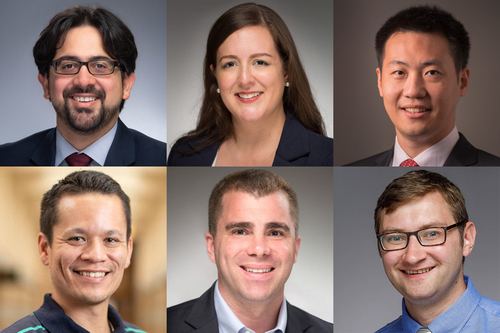
This year, six researchers at the University of Notre Dame have received the National Science Foundation’s most prestigious award for early career researchers. Since 2014, Notre Dame faculty have earned 61 of these nationally competitive awards.
The Early Career Development (CAREER) awards honor early career faculty members who exhibit the potential to “serve as academic role models” and “lead advances in the mission of their department or organization.”
Each awardee receives half a million dollars or more in research funding over five years to support a project that combines scholarship with teaching. Through these projects, awardees “build a firm foundation for a lifetime of leadership in integrating education and research.”
“We would like to congratulate these early career faculty on this tremendous achievement,” said Robert J. Bernhard, vice president for research and professor of aerospace and mechanical engineering. “Not only are they admired emerging leaders in their respective fields, they are also models of what it looks like to do research at Notre Dame — research that makes a difference in the lab as well as in the classroom.”
The following awardees made this year’s list:
Yamil Colón, an assistant professor of chemical and biomolecular engineering, received the award for “Navigating thermodynamic landscapes for phase equilibria predictions using molecular modeling and machine learning.” Colón's project aims to understand the complex ways gases adhere to the surface of porous materials.
Maria Holland, an assistant professor of aerospace and mechanical engineering, received the award for “Unfolding the cortex: Biomechanics-informed analysis of cortical thickness.” Holland’s project will provide better measurements and a deeper understanding of the variations found in the brain’s cerebral cortex.
Meng Jiang, an assistant professor of computer science and engineering, received the award for “Synergistic approaches for specialized intelligent assistance.” Jiang's project will develop new algorithms to improve the quality of assistance for people who seek help on social media for anxiety, depression and other mental illnesses.
Marc Muller, an assistant professor in civil and environmental engineering and earth sciences, received the award for “Sociohydrology to link climate change and its societal impacts.” Muller’s project will create new statistical tools and models to measure water resources and distinguish human-driven changes from changes caused by natural events.
Casey O'Brien, an assistant professor of chemical and biomolecular engineering, received the award for “Catalytic membranes for integrated CO2 capture and conversion.” O'Brien’s project will develop a catalytic membrane that can efficiently remove excess carbon dioxide from the atmosphere.
Mark Plecnik, an assistant professor of aerospace and mechanical engineering, received the award for “The foundations of ellipsoid synthesis theory.” Plecnik’s project will introduce a new mathematical framework and a fresh approach to designing more effective robotics.
In addition to these six new awards, two faculty members transferred their recently received CAREER awards to the University when they joined this year. They include:
Evan Kirby transferred his award from the California Institute of Technology, where he was an assistant professor of astronomy and astrophysics before joining Notre Dame as an associate professor of physics and astronomy. His project, “Nucleosynthesis in degenerate stars,” aims to discover more about the powerful explosions of dense stars, including which types of explosions created the elements found on Earth and throughout the universe.
Yanfang (Fanny) Ye, the Collegiate Associate Professor of Computer Science and Engineering at Notre Dame, transferred her award from West Virginia University, where she was previously an assistant professor of computer science and electrical engineering. Her project, “Securing cyberspace: Gaining deep insights into the online underground ecosystem,” will help make cyberspace more secure by designing and developing an integrated computational framework for investigating cybercrime.
Established in 1995, NSF CAREER awards currently support 35 active research projects at the University of Notre Dame. To learn more, visit https://beta.nsf.gov/funding/opportunities/faculty-early-career-development-program-career.
Contact: Brett Beasley, writer and editorial program manager, Notre Dame Research, bbeasle1@nd.edu, 574-631-8183; research.nd.edu, @UNDResearch
Originally published by at research.nd.edu on July 21, 2022.